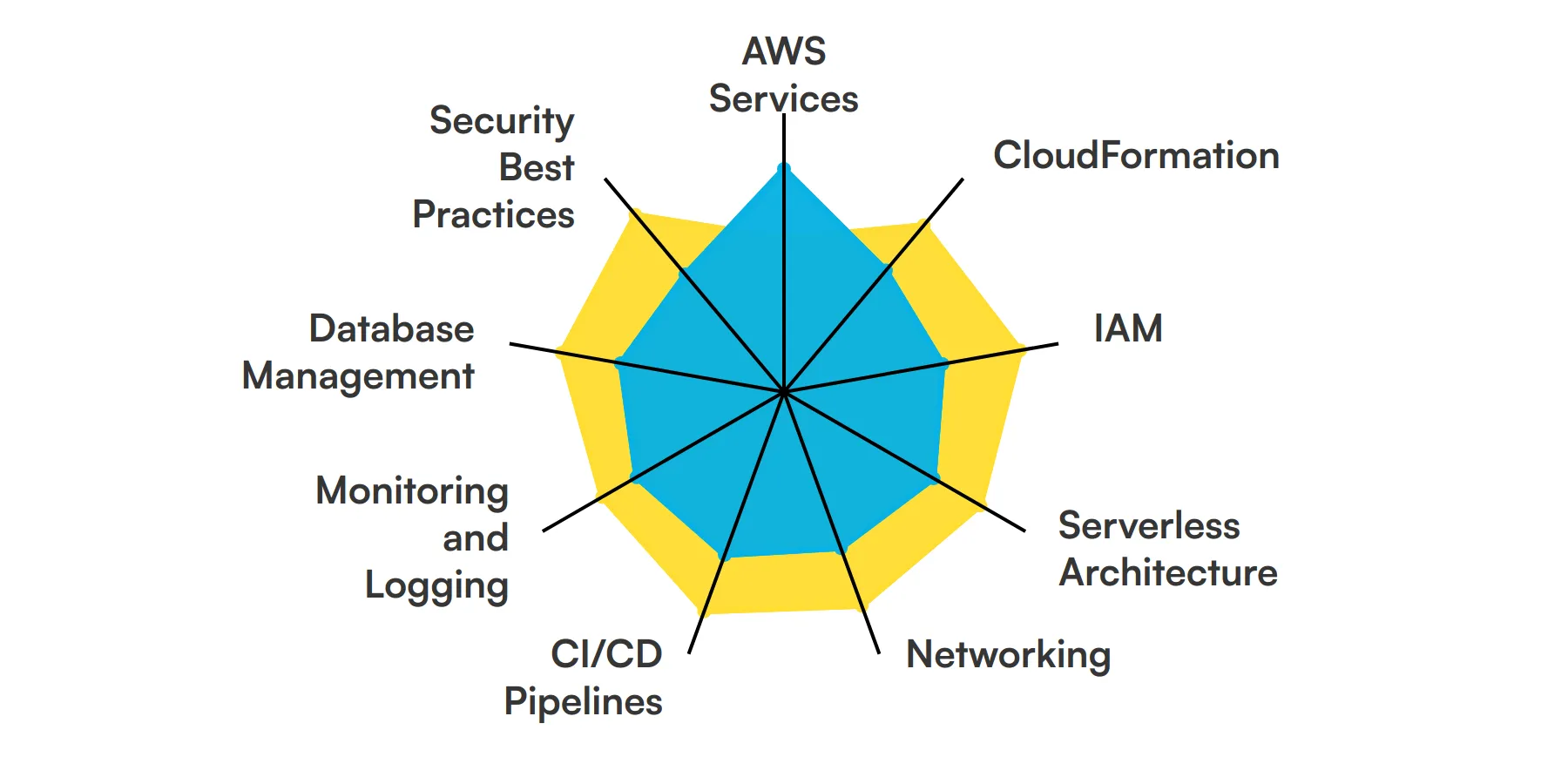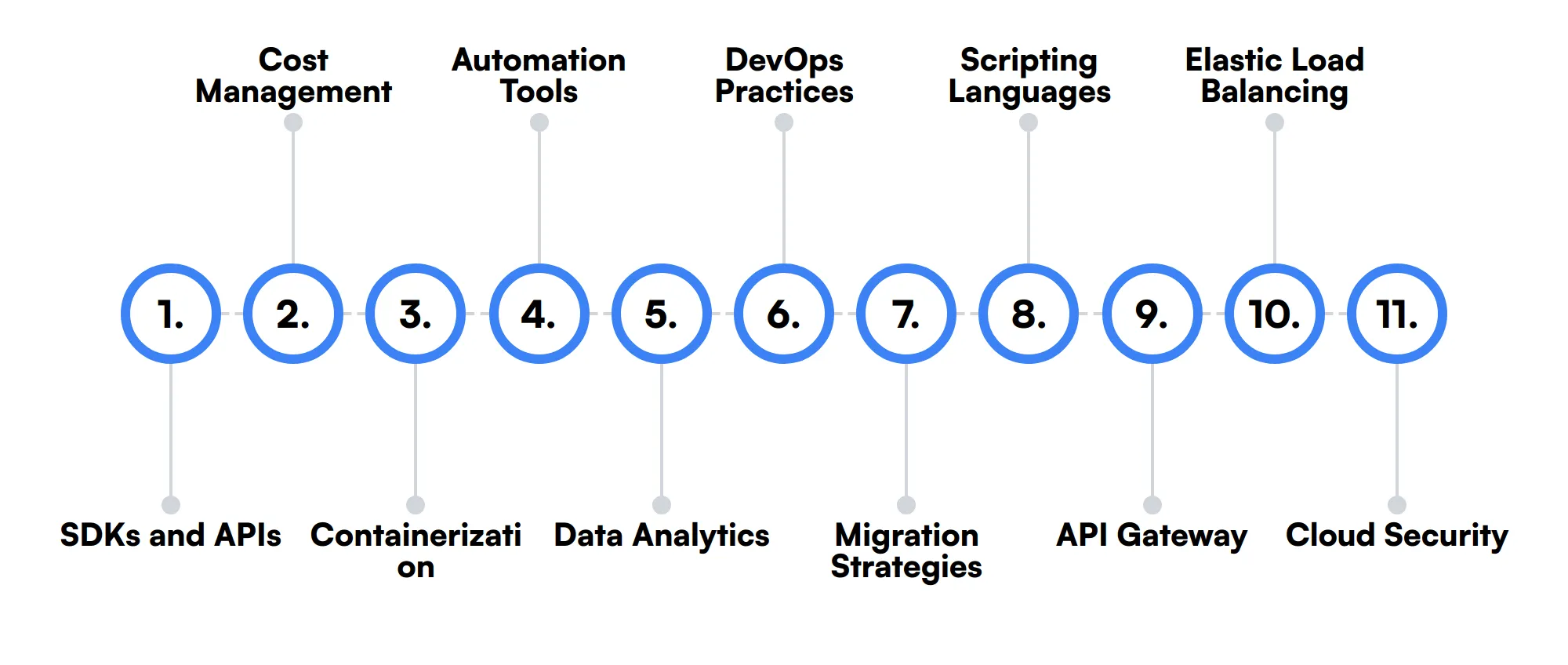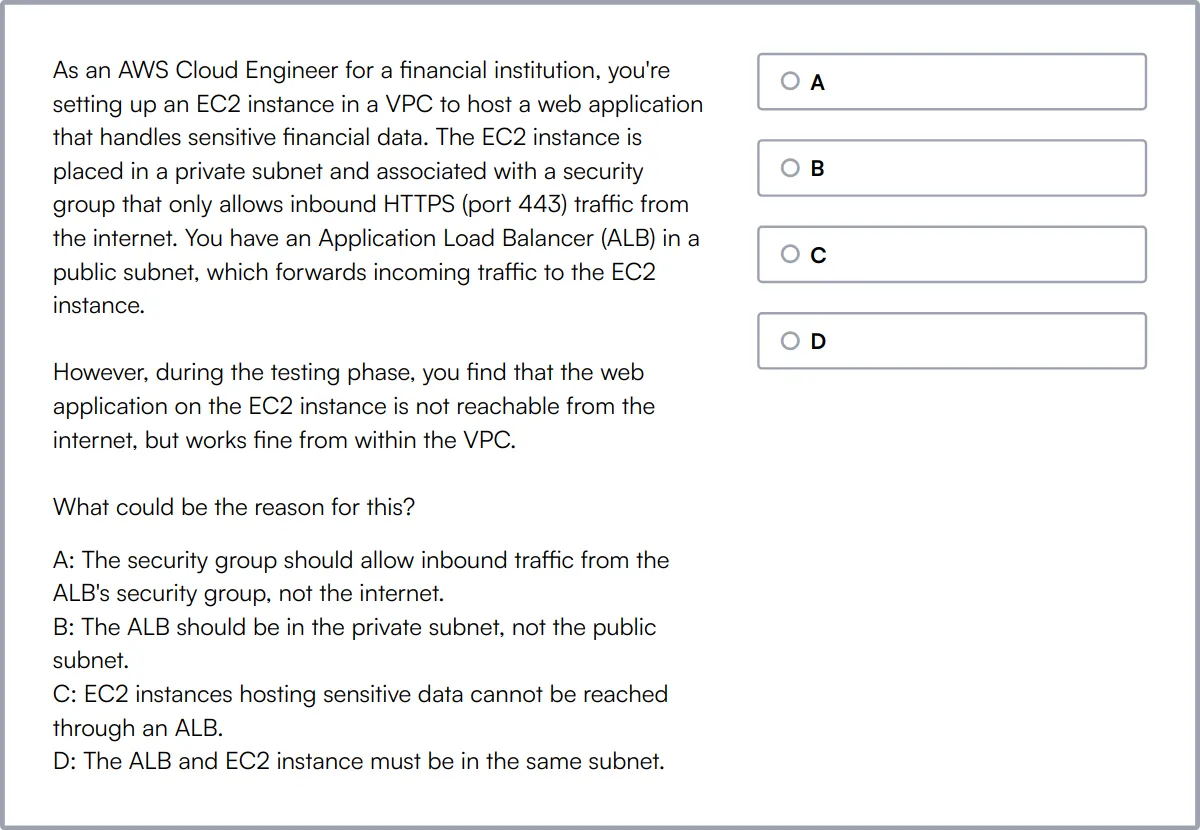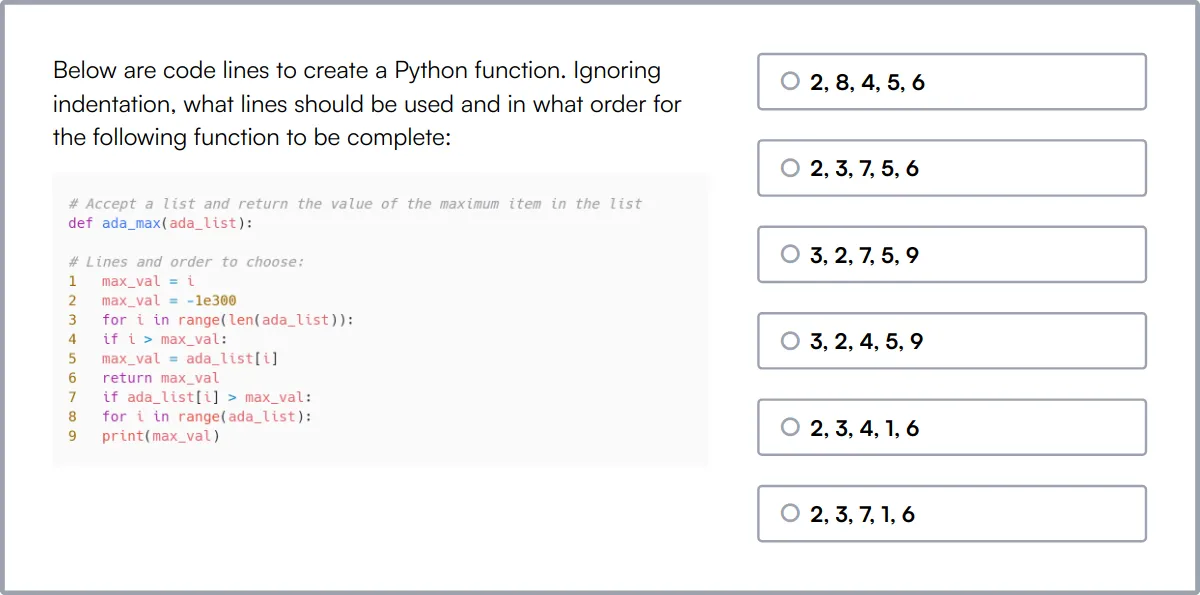AWS developers are at the heart of cloud infrastructure, building and managing applications on Amazon Web Services. They ensure that cloud-based systems are robust, scalable, and optimized for performance.
Skills necessary for an AWS developer include proficiency in AWS services and tools, understanding of cloud security practices, and programming skills in languages like Python or Java. Additionally, they need strong problem-solving abilities and effective communication skills.
Candidates can write these abilities in their resumes, but you can’t verify them without on-the-job AWS Developer skill tests.
In this post, we will explore 9 essential AWS Developer skills, 11 secondary skills and how to assess them so you can make informed hiring decisions.
Table of contents
9 fundamental AWS Developer skills and traits
The best skills for AWS Developers include AWS Services, CloudFormation, IAM, Serverless Architecture, Networking, CI/CD Pipelines, Monitoring and Logging, Database Management and Security Best Practices.
Let’s dive into the details by examining the 9 essential skills of a AWS Developer.

AWS Services
An AWS Developer must be proficient in a wide range of AWS services such as EC2, S3, Lambda, and RDS. These services form the backbone of most AWS applications, and understanding them is crucial for building, deploying, and managing applications in the cloud.
For more insights, check out our guide to writing a AWS Developer Job Description.
CloudFormation
CloudFormation allows developers to define and provision AWS infrastructure using code. This skill is essential for automating the setup of AWS resources, ensuring consistency across environments, and enabling infrastructure as code practices.
IAM
Identity and Access Management (IAM) is critical for securing AWS environments. An AWS Developer needs to manage user permissions and roles effectively to ensure that only authorized users can access specific resources, thereby maintaining security and compliance.
Serverless Architecture
Understanding serverless architecture, including services like AWS Lambda and API Gateway, is important for building scalable and cost-effective applications. This approach allows developers to focus on writing code without worrying about server management.
Networking
Networking skills are necessary for configuring VPCs, subnets, and security groups. An AWS Developer must ensure that applications are securely and efficiently connected to the internet and other AWS services, optimizing performance and security.
Check out our guide for a comprehensive list of interview questions.
CI/CD Pipelines
Continuous Integration and Continuous Deployment (CI/CD) pipelines automate the process of testing and deploying code. Familiarity with AWS CodePipeline, CodeBuild, and CodeDeploy helps in streamlining the development workflow and reducing deployment errors.
Monitoring and Logging
Monitoring and logging are essential for maintaining the health and performance of applications. AWS Developers use services like CloudWatch and CloudTrail to track application performance, detect issues, and ensure compliance with operational standards.
Database Management
Managing databases on AWS, whether relational (RDS) or NoSQL (DynamoDB), is a key skill. An AWS Developer must design, deploy, and maintain databases to ensure data integrity, availability, and performance.
For more insights, check out our guide to writing a Database Administrator (DBA) Job Description.
Security Best Practices
Implementing security best practices is non-negotiable for an AWS Developer. This includes encryption, secure access controls, and regular security audits to protect data and applications from threats.
11 secondary AWS Developer skills and traits
The best skills for AWS Developers include SDKs and APIs, Cost Management, Containerization, Automation Tools, Data Analytics, DevOps Practices, Migration Strategies, Scripting Languages, API Gateway, Elastic Load Balancing and Cloud Security.
Let’s dive into the details by examining the 11 secondary skills of a AWS Developer.

SDKs and APIs
Knowledge of AWS SDKs and APIs is useful for integrating AWS services with applications. This allows developers to programmatically interact with AWS resources, enhancing automation and functionality.
Cost Management
Understanding AWS pricing models and cost management tools helps in optimizing resource usage and controlling expenses. This skill is important for ensuring that applications are cost-effective.
Containerization
Familiarity with containerization technologies like Docker and orchestration tools like Kubernetes or AWS ECS/EKS is beneficial. This helps in deploying and managing containerized applications efficiently.
Automation Tools
Using automation tools like AWS CLI, SDKs, and third-party tools can streamline repetitive tasks. This skill helps in improving productivity and reducing the potential for human error.
Data Analytics
Basic knowledge of data analytics services like AWS Redshift, Athena, and QuickSight can be advantageous. This allows developers to build data-driven applications and gain insights from data.
DevOps Practices
Understanding DevOps practices and tools is beneficial for an AWS Developer. This includes using tools like Jenkins, Git, and Terraform to automate and manage the software development lifecycle.
Migration Strategies
Knowledge of migration strategies and tools like AWS Migration Hub and Database Migration Service is useful for moving existing applications to the cloud. This ensures a smooth transition with minimal downtime.
Scripting Languages
Proficiency in scripting languages like Python, Bash, or PowerShell can be helpful for automating tasks and managing AWS resources. This skill enhances the ability to write custom scripts for various operations.
API Gateway
Understanding how to use API Gateway for creating, deploying, and managing APIs is beneficial. This service allows developers to create RESTful APIs that can interact with AWS services and other web applications.
Elastic Load Balancing
Knowledge of Elastic Load Balancing (ELB) helps in distributing incoming application traffic across multiple targets. This ensures high availability and fault tolerance for applications.
Cloud Security
Basic understanding of cloud security principles and AWS security services like GuardDuty, Inspector, and WAF is useful. This helps in identifying and mitigating security threats.
How to assess AWS Developer skills and traits
Assessing AWS Developer skills involves more than just reviewing resumes and certifications. It's about understanding their practical knowledge and ability to apply AWS services in real-world scenarios. From managing IAM roles to setting up CI/CD pipelines, an AWS Developer's expertise spans a wide range of areas.
Traditional hiring methods often fall short in evaluating these diverse skills effectively. This is where skills-based assessments come into play. By using targeted assessments, you can get a clear picture of a candidate's proficiency in key areas like CloudFormation, Serverless Architecture, and Security Best Practices.
For a comprehensive evaluation, consider using Adaface on-the-job skill tests. These assessments can help you achieve a 2x improved quality of hires and an 85% reduction in screening time. With Adaface, you can tailor the tests to focus on specific AWS services, networking, database management, and more, ensuring you find the right fit for your team.
Let’s look at how to assess AWS Developer skills with these 2 talent assessments.
Advance Networking in AWS Online Test
The Advance Networking in AWS Online Test evaluates a candidate's understanding of various networking concepts and their implementation on the Amazon Web Services (AWS) platform.
The test assesses their understanding of VPC, subnets, route tables, internet gateways, load balancers, VPN connections, and network security. It evaluates the candidate's ability to design, configure, and troubleshoot network architectures in AWS.
Successful candidates have a strong grasp of AWS networking, including VPC peering, NAT gateways, and Direct Connect. They also demonstrate proficiency in network security and DNS in AWS.

AWS DevOps Test
The AWS DevOps Test is a scenario-based online test designed to assess a candidate's proficiency in working with AWS and implementing DevOps best practices.
The test evaluates the candidate's understanding of cloud computing, infrastructure as code, continuous integration and delivery, configuration management, containerization, and monitoring and logging. It also covers Python basics, Linux fundamentals, and shell scripting.
High-scoring candidates show proficiency in AWS core services and troubleshooting, as well as Python OOPs and data structures. They also demonstrate strong skills in configuration management and AWS debugging.

Summary: The 9 key AWS Developer skills and how to test for them
| AWS Developer skill | How to assess them |
|---|---|
| 1. AWS Services | Evaluate familiarity with core AWS services and their practical applications. |
| 2. CloudFormation | Assess ability to define and deploy infrastructure as code. |
| 3. IAM | Check understanding of user roles, permissions, and security policies. |
| 4. Serverless Architecture | Gauge experience in building and managing serverless applications. |
| 5. Networking | Evaluate knowledge of VPCs, subnets, and network configurations. |
| 6. CI/CD Pipelines | Assess skills in automating deployment and integration processes. |
| 7. Monitoring and Logging | Check proficiency in using monitoring tools and analyzing logs. |
| 8. Database Management | Evaluate ability to manage and optimize AWS database services. |
| 9. Security Best Practices | Assess understanding of AWS security protocols and best practices. |
AWS Online Assessment Test
AWS Developer skills FAQs
What AWS services should an AWS Developer be familiar with?
An AWS Developer should be familiar with services like EC2, S3, Lambda, RDS, DynamoDB, and API Gateway. These services are fundamental for building and managing applications on AWS.
How can you assess a candidate's knowledge of CloudFormation?
Ask candidates to create a simple CloudFormation template during the interview. Evaluate their understanding of stacks, templates, and resource management.
Why is IAM important for an AWS Developer?
IAM (Identity and Access Management) is crucial for managing access to AWS resources. Assess candidates on their ability to create and manage IAM roles, policies, and users.
What are the key components of a CI/CD pipeline in AWS?
Key components include CodeCommit, CodeBuild, CodeDeploy, and CodePipeline. Evaluate candidates on their experience with these services and their ability to automate deployment processes.
How do you evaluate an AWS Developer's understanding of serverless architecture?
Ask candidates to design a serverless application using AWS Lambda, API Gateway, and DynamoDB. Assess their ability to leverage these services for scalable solutions.
What are some best practices for monitoring and logging in AWS?
Best practices include using CloudWatch for monitoring, CloudTrail for logging API calls, and setting up alarms for critical metrics. Evaluate candidates on their experience with these tools.
How can you assess a candidate's skills in database management on AWS?
Ask about their experience with RDS, DynamoDB, and Aurora. Evaluate their ability to design, deploy, and manage databases, including backup and recovery strategies.
What scripting languages should an AWS Developer know?
Common scripting languages include Python, JavaScript (Node.js), and Bash. Assess candidates on their ability to write scripts for automation and integration with AWS services.
Assess and hire the best AWS Developers with Adaface
Assessing and finding the best AWS Developer is quick and easy when you use talent assessments. You can check out our product tour, sign up for our free plan to see talent assessments in action or view the demo here:

40 min skill tests.
No trick questions.
Accurate shortlisting.
We make it easy for you to find the best candidates in your pipeline with a 40 min skills test.
Try for freeRelated posts
Free resources



